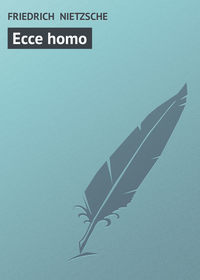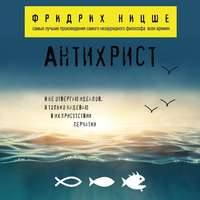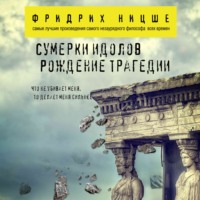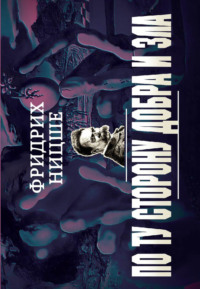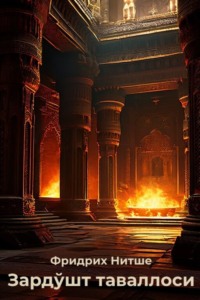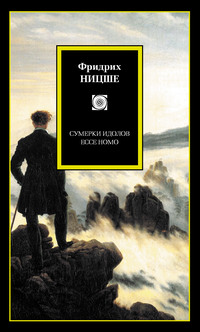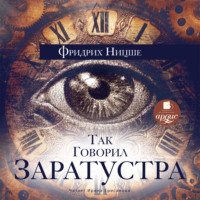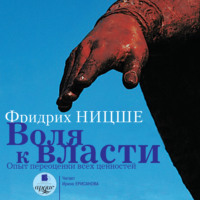 полная версия
полная версияWe Philologists
Now there are so many things to which men have become so accustomed that they look upon them as quite appropriate and suitable, for habit intermixes all things with sweetness; and men as a rule judge the value of a thing in accordance with their own desires. The desire for classical antiquity as it is now felt should be tested, and, as it were, taken to pieces and analysed with a view to seeing how much of this desire is due to habit, and how much to mere love of adventure – I refer to that inward and active desire, new and strange, which gives rise to a productive conviction from day to day, the desire for a higher goal, and also the means thereto · as the result of which people advance step by step from one unfamiliar thing to another, like an Alpine climber.
What is the foundation on which the high value attached to antiquity at the present time is based, to such an extent indeed that our whole modern culture is founded on it? Where must we look for the origin of this delight in antiquity, and the preference shown for it?
I think I have recognised in my examination of the question that all our philology – that is, all its present existence and power – is based on the same foundation as that on which our view of antiquity as the most important of all means of training is based. Philology as a means of instruction is the clear expression of a predominating conception regarding the value of antiquity, and the best methods of education. Two propositions are contained in this statement. In the first place all higher education must be a historical one, and secondly, Greek and Roman history differs from all others in that it is classical. Thus the scholar who knows this history becomes a teacher. We are not here going into the question as to whether higher education ought to be historical or not; but we may examine the second and ask: in how far is it classic?
On this point there are many widespread prejudices. In the first place there is the prejudice expressed in the synonymous concept, "The study of the humanities": antiquity is classic because it is the school of the humane.
Secondly: "Antiquity is classic because it is enlightened – "
28
It is the task of all education to change certain conscious actions and habits into more or less unconscious ones; and the history of mankind is in this sense its education. The philologist now practises unconsciously a number of such occupations and habits. It is my object to ascertain how his power, that is, his instinctive methods of work, is the result of activities which were formerly conscious, but which he has gradually come to feel as such no longer: but that consciousness consisted of prejudices. The present power of philologists is based upon these prejudices, for example the value attached to the ratio as in the cases of Bentley and Hermann. Prejudices are, as Lichtenberg says, the art impulses of men.
29
It is difficult to justify the preference for antiquity since it has arisen from prejudices:
1. From ignorance of all non-classical antiquity.
2. From a false idealisation of humanitarianism, whilst Hindoos and Chinese are at all events more humane.
3. From the pretensions of school-teachers.
4. From the traditional admiration which emanated from antiquity itself.
5. From opposition to the Christian church; or as a support for this church.
6. From the impression created by the century-long work of the philologists, and the nature of this work. It must be a gold mine, thinks the spectator.
7. The acquirement of knowledge attained as the result of the study. The preparatory school of science.
In short, partly from ignorance, wrong impressions, and misleading conclusions; and also from the interest which philologists have in raising their science to a high level in the estimation of laymen.
Also the preference for antiquity on the part of the artists, who involuntarily assume proportion and moderation to be the property of all antiquity. Purity of form. Authors likewise.
The preference for antiquity as an abbreviation of the history of the human race, as if there were an autochthonous creation here by which all becoming might be studied.
The fact actually is that the foundations of this preference are being removed one by one, and if this is not remarked by philologists themselves, it is certainly being remarked as much as it can possibly be by people outside their circle. First of all history had its effect, and then linguistics brought about the greatest diversion among philologists themselves, and even the desertion of many of them. They have still the schools in their hands: but for how long! In the form in which it has existed up to the present philology is dying out; the ground has been swept from under its feet. Whether philologists may still hope to maintain their status is doubtful; in any case they are a dying race.
30
The peculiarly significant situation of philologists: a class of people to whom we entrust our youth, and who have to investigate quite a special antiquity. The highest value is obviously attached to this antiquity. But if this antiquity has been wrongly valued, then the whole foundation upon which the high position of the philologist is based suddenly collapses. In any case this antiquity has been very differently valued, and our appreciation of the philologists has constantly been guided by it. These people have borrowed their power from the strong prejudices in favour of antiquity, – this must be made clear.
Philologists now feel that when these prejudices are at last refuted, and antiquity depicted in its true colours, the favourable prejudices towards them will diminish considerably. It is thus to the interest of their profession not to let a clear impression of antiquity come to light; in particular the impression that antiquity in its highest sense renders one "out of season?" i.e., an enemy to one's own time.
It is also to the interest of philologists as a class not to let their calling as teachers be regarded from a higher standpoint than that to which they themselves can correspond.
31
It is to be hoped that there are a few people who look upon it as a problem why philologists should be the teachers of our noblest youths. Perhaps the case will not be always so – It would be much more natural per se if our children were instructed in the elements of geography, natural science, political economy, and sociology, if they were gradually led to a consideration of life itself, and if finally, but much later, the most noteworthy events of the past were brought to their knowledge. A knowledge of antiquity should be among the last subjects which a student would take up; and would not this position of antiquity in the curriculum of a school be more honourable for it than the present one? – Antiquity is now used merely as a propædeutic for thinking, speaking, and writing; but there was a time when it was the essence of earthly knowledge, and people at that time wished to acquire by means of practical learning what they now seek to acquire merely by means of a detailed plan of study – a plan which, corresponding to the more advanced knowledge of the age, has entirely changed.
Thus the inner purpose of philological teaching has been entirely altered; it was at one time material teaching, a teaching that taught how to live, but now it is merely formal.2
32
If it were the task of the philologist to impart formal education, it would be necessary for him to teach walking, dancing, speaking, singing, acting, or arguing · and the so-called formal teachers did impart their instruction this way in the second and third centuries. But only the training of a scientific man is taken into account, which results in "formal" thinking and writing, and hardly any speaking at all.
33
If the gymnasium is to train young men for science, people now say there can be no more preliminary preparation for any particular science, so comprehensive have all the sciences become. As a consequence teachers have to train their students generally, that is to say for all the sciences – for scientificality in other words; and for that classical studies are necessary! What a wonderful jump! a most despairing justification! Whatever is, is right,3 even when it is clearly seen that the "right" on which it has been based has turned to wrong.
34
It is accomplishments which are expected from us after a study of the ancients: formerly, for example, the ability to write and speak. But what is expected now! Thinking and deduction. but these things are not learnt from the ancients, but at best through the ancients, by means of science. Moreover, all historical deduction is very limited and unsafe, natural science should be preferred.
35
It is the same with the simplicity of antiquity as it is with the simplicity of style: it is the highest thing which we recognise and must imitate; but it is also the last. Let it be remembered that the classic prose of the Greeks is also a late result.
36
What a mockery of the study of the "humanities" lies in the fact that they were also called "belles lettres" (bellas litteras)!
37
Wolf's4 reasons why the Egyptians, Hebrews, Persians, and other Oriental nations were not to be set on the same plane with the Greeks and Romans: "The former have either not raised themselves, or have raised themselves only to a slight extent, above that type of culture which should be called a mere civilisation and bourgeois acquirement, as opposed to the higher and true culture of the mind." He then explains that this culture is spiritual and literary: "In a well-organised nation this may be begun earlier than order and peacefulness in the outward life of the people (enlightenment)."
He then contrasts the inhabitants of easternmost Asia ("like such individuals, who are not wanting in clean, decent, and comfortable dwellings, clothing, and surroundings; but who never feel the necessity for a higher enlightenment") with the Greeks ("in the case of the Greeks, even among the most educated inhabitants of Attica, the contrary often happens to an astonishing degree; and the people neglect as insignificant factors that which we, thanks to our love of order, are in the habit of looking upon as the foundations of mental culture itself").
38
Our terminology already shows how prone we are to judge the ancients wrongly: the exaggerated sense of literature, for example, or, as Wolf, when speaking of the "inner history of ancient erudition," calls it, "the history of learned enlightenment."
39
According to Goethe, the ancients are "the despair of the emulator." Voltaire said. "If the admirers of Homer were honest, they would acknowledge the boredom which their favourite often causes them."
40
The position we have taken up towards classical antiquity is at bottom the profound cause of the sterility of modern culture; for we have taken all this modern conception of culture from the Hellenised Romans. We must distinguish within the domain of antiquity itself: when we come to appreciate its purely productive period, we condemn at the same time the entire Romano-Alexandrian culture. But at the same time also we condemn our own attitude towards antiquity, and likewise our philology.
41
There has been an age-long battle between the Germans and antiquity, i. e., a battle against the old culture. It is certain that precisely what is best and deepest in the German resists it. The main point, however, is that such resistance is only justifiable in the case of the Romanised culture; for this culture, even at that time, was a falling-off from something more profound and noble. It is this latter that the Germans are wrong in resisting.
42
Everything classic was thoroughly cultivated by Charles the Great, whilst he combated everything heathen with the severest possible measures of coercion. Ancient mythology was developed, but German mythology was treated as a crime. The feeling underlying all this, in my opinion, was that Christianity had already overcome the old religion · people no longer feared it, but availed themselves of the culture that rested upon it. But the old German gods were feared.
A great superficiality in the conception of antiquity – little else than an appreciation of its formal accomplishments and its knowledge – must thereby have been brought about. We must find out the forces that stood in the way of increasing our insight into antiquity. First of all, the culture of antiquity is utilised as an incitement towards the acceptance of Christianity · it became, as it were, the premium for conversion, the gilt with which the poisonous pill was coated before being swallowed. Secondly, the help of ancient culture was found to be necessary as a weapon for the intellectual protection of Christianity. Even the Reformation could not dispense with classical studies for this purpose.
The Renaissance, on the other hand, now begins, with a clearer sense of classical studies, which, however, are likewise looked upon from an anti-Christian standpoint: the Renaissance shows an awakening of honesty in the south, like the Reformation in the north. They could not but clash; for a sincere leaning towards antiquity renders one unchristian.
On the whole, however, the Church succeeded in turning classical studies into a harmless direction. the philologist was invented, representing a type of learned man who was at the same time a priest or something similar. Even in the period of the Reformation people succeeded in emasculating scholarship. It is on this account that Friedrich August Wolf is noteworthy he freed his profession from the bonds of theology. This action of his, however, was not fully understood; for an aggressive, active element, such as was manifested by the poet-philologists of the Renaissance, was not developed. The freedom obtained benefited science, but not man.
43
It is true that both humanism and rationalism have brought antiquity into the field as an ally; and it is therefore quite comprehensible that the opponents of humanism should direct their attacks against antiquity also. Antiquity, however, has been misunderstood and falsified by humanism · it must rather be considered as a testimony against humanism, against the benign nature of man, &c. The opponents of humanism are wrong to combat antiquity as well; for in antiquity they have a strong ally.
44
It is so difficult to understand the ancients. We must wait patiently until the spirit moves us. The human element which antiquity shows us must not be confused with humanitarianism. This contrast must be strongly emphasised: philology suffers by endeavouring to substitute the humanitarian, young men are brought forward as students of philology in order that they may thereby become humanitarians. A good deal of history, in my opinion, is quite sufficient for that purpose. The brutal and self-conscious man will be humbled when he sees things and values changing to such an extent.
The human element among the Greeks lies within a certain naiveté, through which man himself is to be seen – state, art, society, military and civil law, sexual relations, education, party. It is precisely the human element which may be seen everywhere and among all peoples, but among the Greeks it is seen in a state of nakedness and inhumanity which cannot be dispensed with for purposes of instruction. In addition to this, the Greeks have created the greatest number of individuals, and thus they give us so much insight into men, – a Greek cook is more of a cook than any other.
45
I deplore a system of education which does not enable people to understand Wagner, and as the result of which Schopenhauer sounds harsh and discordant in our ears. such a system of education has missed its aim.
46
(The Final Draft of the First Chapter.)Il faut dire la vérité et s'immoler – Voltaire.
Let us suppose that there were freer and more superior spirits who were dissatisfied with the education now in vogue, and that they summoned it to their tribunal, what would the defendant say to them? In all probability something like this: "Whether you have a right to summon anyone here or not, I am at all events not the proper person to be called. It is my educators to whom you should apply. It is their duty to defend me, and I have a right to keep silent. I am merely what they have made me."
These educators would now be hauled before the tribunal, and among them an entire profession would be observed · the philologists. This profession consists in the first place of those men who make use of their knowledge of Greek and Roman antiquity to bring up youths of thirteen to twenty years of age, and secondly of those men whose task it is to train specially-gifted pupils to act as future teachers —i. e., as the educators of educators. Philologists of the first type are teachers at the public schools, those of the second are professors at the universities.
The first-named philologists are entrusted with the care of certain specially-chosen youths, those who, early in life, show signs of talent and a sense of what is noble, and whose parents are prepared to allow plenty of time and money for their education. If other boys, who do not fulfil these three conditions, are presented to the teachers, the teachers have the right to refuse them. Those forming the second class, the university professors, receive the young men who feel themselves fitted for the highest and most responsible of callings, that of teachers and moulders of mankind; and these professors, too, may refuse to have anything to do with young men who are not adequately equipped or gifted for the task.
If, then, the educational system of a period is condemned, a heavy censure on philologists is thereby implied: either, as the consequence of their wrong-headed view, they insist on giving bad education in the belief that it is good; or they do not wish to give this bad education, but are unable to carry the day in favour of education which they recognise to be better. In other words, their fault is either due to their lack of insight or to their lack of will. In answer to the first charge they would say that they knew no better, and in answer to the second that they could do no better. As, however, these philologists bring up their pupils chiefly with the aid of Greek and Roman antiquity, their want of insight in the first case may be attributed to the fact that they do not understand antiquity, and again to the fact that they bring forward antiquity into the present age as if it were the most important of all aids to instruction, while antiquity, generally speaking, does not assist in training, or at all events no longer does so.
On the other hand, if we reproach our professors with their lack of will, they would be quite right in attributing educational significance and power to antiquity; but they themselves could not be said to be the proper instruments by means of which antiquity could exhibit such power. In other words, the professors would not be real teachers and would be living under false colours, but how, then, could they have reached such an irregular position? Through a misunderstanding of themselves and their qualifications. In order, then, that we may ascribe to philologists their share in this bad educational system of the present time, we may sum up the different factors of their innocence and guilt in the following sentence: the philologist, if he wishes for a verdict of acquittal, must understand three things antiquity, the present time, and himself · his fault lies in the fact that he either does not understand antiquity, or the present time, or himself.
47
It is not true to say that we can attain culture through antiquity alone. We may learn something from it, certainly; but not culture as the word is now understood. Our present culture is based on an emasculated and mendacious study of antiquity. In order to understand how ineffectual this study is, just look at our philologists · they, trained upon antiquity, should be the most cultured men. Are they?
48
Origin of the philologist. When a great work of art is exhibited there is always some one who not only feels its influence but wishes to perpetuate it. The same remark applies to a great state – to everything, in short, that man produces. Philologists wish to perpetuate the influence of antiquity and they can set about it only as imitative artists. Why not as men who form their lives after antiquity?
49
The decline of the poet-scholars is due in great part to their own corruption: their type is continually arising again; Goethe and Leopardi, for example, belong to it. Behind them plod the philologist-savants. This type has its origin in the sophisticism of the second century.
50
Ah, it is a sad story, the story of philology! The disgusting erudition, the lazy, inactive passivity, the timid submission. – Who was ever free?
51
When we examine the history of philology it is borne in upon us how few really talented men have taken part in it. Among the most celebrated philologists are a few who ruined their intellect by acquiring a smattering of many subjects, and among the most enlightened of them were several who could use their intellect only for childish tasks. It is a sad story · no science, I think, has ever been so poor in talented followers. Those whom we might call the intellectually crippled found a suitable hobby in all this hair-splitting.
52
The teacher of reading and writing, and the reviser, were the first types of the philologist.
53
Friedrich August Wolf reminds us how apprehensive and feeble were the first steps taken by our ancestors in moulding scholarship – how even the Latin classics, for example, had to be smuggled into the university market under all sorts of pretexts, as if they had been contraband goods. In the "Gottingen Lexicon" of 1737, J. M. Gesner tells us of the Odes of Horace: "ut imprimis, quid prodesse in severioribus studiis possint, ostendat."
54
I was pleased to read of Bentley "non tam grande pretium emendatiunculis meis statuere soleo, ut singularem aliquam gratiam inde sperem aut exigam."
Newton was surprised that men like Bentley and Hare should quarrel about a book of ancient comedies, since they were both theological dignitaries.
55
Horace was summoned by Bentley as before a judgment seat, the authority of which he would have been the first to repudiate. The admiration which a discriminating man acquires as a philologist is in proportion to the rarity of the discrimination to be found in philologists. Bentley's treatment of Horace has something of the schoolmaster about it It would appear at first sight as if Horace himself were not the object of discussion, but rather the various scribes and commentators who have handed down the text: in reality, however, it is actually Horace who is being dealt with. It is my firm conviction that to have written a single line which is deemed worthy of being commented upon by scholars of a later time, far outweighs the merits of the greatest critic. There is a profound modesty about philologists. The improving of texts is an entertaining piece of work for scholars, it is a kind of riddle-solving; but it should not be looked upon as a very important task. It would be an argument against antiquity if it should speak less clearly to us because a million words stood in the way!
56
A school-teacher said to Bentley, "Sir, I will make your grandchild as great a scholar as you are yourself." "How can you do that," replied Bentley, "when I have forgotten more than you ever knew?"
57


